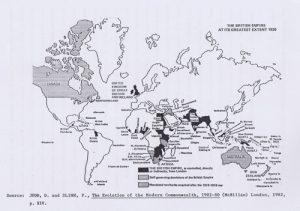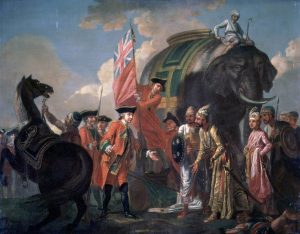American Anti-Colonialism, and the Liquidation of the British Empire.
As a result, Britain’s power arising from trading wealth was based more heavily upon the rest of the world than upon the empire in both exports and imports. As to the former, Germany, Holland and Belgium were the biggest buyers of British goods followed by the United States. At this time, although Britain no longer looked to the colonies as a major trading partner many of the colonies still tended to see economic advantage in retaining an imperial link. Britain provided both a ready source for colonial needs and a convenient outlet for colonial products. India, South African and New Zealand looked almost automatically to Britain as their first major supplier.
In any case, British traders began to realize that economic expansion does not necessarily have to depend on creation of a territorial or political empire. It was not necessary for the land of economic exploitation to be formally annexed to the British crown. In fact, many traders and investors of the United Kingdom thought that absence of full-scale official British control was more practical. This is because the latter often involved bureaucratic interference and even restriction, because the authorities would impose control and regulations on the not always lawful activities of the traders.
Often the economic expansionists were satisfied with a minimal British presence, just sufficient to preserve order so that trade and investment could take place safely. They agreed with a sphere of British influence if European powers were thinking of competition, particularly in the economic field; or the British traders and investors were ready to accept a British consul if a local ruler was proving obstructive to their economic efforts; or occasionally the British economic interests would ask for a gun-boat to be sent in, to threaten and perhaps punish a difficult local group, especially if the latter had turned against the British economic presence and become destructive of British property and lives.
The traders and investors preserved existing economic links with traditional markets in Europe and the United States as well as of course the colonies, but on the other hand became more concerned with seeking new economic advantages in areas hitherto outside the British trading-zone. As the nineteenth century reached its end British economic influence spread further field, into the far east and Latin America, creating an ‘informal empire’.
“Britain’s economic relations with China could be taken as an example of this growth of informal British power. Initial penetration arose out of the activities of the East India Company. Then private traders, such as the Rathbones and Swires, moved in and they, backed up by an official British strategic presence in Hong Kong after 1841, began to institute a greater British influence into mainland China as the century progressed. By the 1870s British-Indian-Hong Kong trade with China was at a peak, supplying ninety per cent of China’s imports and taking seventy per cent of its exports. Meanwhile, Britain was also pushing open markets in Brazil as well as tapping supplies there and in Cuba and Peru.”12



